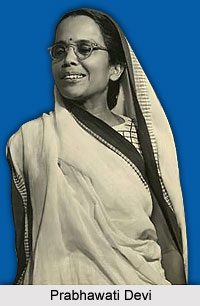 Prabhawati Devi was a freedom fighter and a social worker. She was a courageous and self-determined woman who lived her entire life for the upliftment of poor and downtrodden people. Though she had close contact with people of power and influence she never sought anything for herself.
Prabhawati Devi was a freedom fighter and a social worker. She was a courageous and self-determined woman who lived her entire life for the upliftment of poor and downtrodden people. Though she had close contact with people of power and influence she never sought anything for herself.
Prabhawati was born on 1906. Her father was Shri Brajkishore Prasad, a renowned congress leader of Bihar. She was the eldest among his four children. Her father brought her her up like a son. She received her primary education at home, but was by no means curbed to the house. She often went to public meetings and listened to the speeches of prominent Indian leaders. As a result she developed great respect for her ancient heritage but at the same time discarded old customs and accepted modern ideas.
She married Jayaprakash Narayan when she was only fourteen and J.P. was eighteen, without any dowry or ostentations. As they were in their teens, it was decided by their parents that the time was not yet ripe for them to stay together. So after a few days of stay with her in-laws, she went back to her parents and her husband left to pursue his second year science course at the Patna College. There, inspired by the spirit of the non-cooperation movement. J.P. left college with a vow never to return to it until India attained freedom.
In 1922 he left for U.S to pursue higher studies. As J.P`s stay in the United States got prolonged, Prabhawati`s father sent her to the Gandhi Ashram. Here she met Gandhi and Kasturba. Both Gandhi and Kasturba treated her like their own daughter. Gandhiji soon became her father, teacher and guide. She, on her part, took keen interest in the ashram life. Bapu taught her daily. She studied the Ramayan and the Gita and tried to acquire knowledge of English. During periods of brief separation Gandhi wrote regularly to her, sometimes almost everyday.
One important outcome of Prabhawati`s stay in Gandhi`s Ashram was her conversion to the ideal of Brahmacharya (celebacy). Though this was one of Gandhi`s favorite ideals he had positively discouraged her, pointing out that she was a young married girl and hence could not take a unilateral decision. But she was inclined in her decision and said that she was attracted towards this idea from her adolescent days.
Long separation from her husband and the pervading atmosphere in Gandhi`s Ashram influenced her in this direction. When J.P. finally returned from the U.S. he went straight to Gandhi`s Ashram at Sabarmati. Gandhi discussed with him the topic of Prabhawati`s vow. He presented to J.P. the option of marrying again. He was very annoyed to hear this from Gandhiji. Though he had no faith in Brahmacharya, he respected Prabhawati`s vow.
At Sabarmati J.P. also met Jawaharlal Nehru. They all travelled together to Lahore, where Nehru presided over the historic Congress Session. J.P. helped Nehru with party work at Allahabad and was given the charge of the Labour Research Department. Prabhawati accompanied her husband to Allahabad. As a result of shared political commitments a deep friendship developed between Prabhawati and Nehru`s wife, Kamala. When Prabhawati moved to Patna with her husband, she was always in touch with Kamala through correspondence.
Prabhawati plunged into the Freedom Movement in 1932. At the time of the annual Congress session at Ramgarh in Bihar, she was made the leader of women volunteers and was appreciated for the role she played in 1942. Once India attained freedom Prabhawati`s was interested in social work related to women and children. She established two institutions, Mahila Charkha Samiti and `Kamala Nehru Shishu Vihar`. Prabhawati`s work for the welfare of children and women will have a high place in the history of social work, particularly in Bihar.
After J.P. was released from prison, Prabhawati, paid attention in looking after him. She moved with him wherever he went like a shadow. J.P. too was deeply attached to her. J.P. found in her a good cook, a nurse, a secretary and indeed a true friend. In the late forties and fifties while J.P. was delivering lectures on socialism and industrial development Prabhawati could be seen at the beside him, plying her "Charkha. Towards the end of his life J.P. publicly approved that it was his wife who had transformed him from Marxism to Gandhism.
Prabavati died of cancer of the uterus on 15 April 1973. Though she is no more with us, she will be remembered forever in our history as a freedom fighter and social worker.






